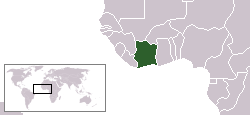 Côte d'Ivoire, Africa Côte d'Ivoire, Africa
République de Côte d'Ivoire
Republic of Côte d'Ivoire
Quick Facts About the Country
Capital - Yamoussoukro; Abidjan remains administrative center
Government - republic; multiparty presidential regime
Currency - Communaute Financiere Africaine franc (XOF)
Area - 322,460 sq km
Population - 16,804,784 (July 2002 est.)
Language - French (official), 60 native dialects with Dioula the most widely spoken
Religion - Christian 20-30%, Muslim 35-40%, indigenous 25-40%
Electricity - 220V/50Hz (European plug)
Calling Code +225
Internet TLD .ci
Time Zone UTC Country Background
Côte d'Ivoire or Ivory Coast in English, officially the Republic of Côte d'Ivoire, is a country in West Africa. It borders Liberia and Guinea to the west, Mali and Burkina Faso to the north, Ghana to the east, and the Gulf of Guinea to the south. Once one of the most prosperous of the tropical West African states, its economy has been undermined by political turmoil and civil war, spawned by corruption and refusal to adopt reforms.
(Wikimedia Foundation, Inc)
Weather and Climate
The southern portion of Côte d’Ivoire has a tropical climate, with hot and humid weather and heavy rains. Temperatures vary from 22°C (72°F) to 32°C (90°F), and the heaviest rains fall from April to July and in October and November. Away from the coast, in the savanna, temperature differences become more extreme, with night lows dropping in January to 12°C (54°F) and day highs in the summer rising above 40°C (104°F). Annual rainfall is 2,100 mm (83 in) in coastal Abidjan and 1,200 mm (48 in) in Bouaké, located on the nation’s central plain.
(Microsoft® Encarta® Reference Library 2003)
Major Travel and Tourism Info (Country Travel Guide)
Major Tour Destinations
Two National Parks are on the UNESCO World Heritage List.
Tai National Park
Comoe National Park
Terrain
Mostly flat to undulating plains; mountains in northwest. Most of the inhabitants live along the sandy coastal region. Apart from the capital area, the forested interior is sparsely populated. The highest point is Mont Nimba (1,752 meters).
\
Traveling by Plane
Abidjan airport has daily scheduled flights to and from Paris (Air France [1]) and Amsterdam (KLM [2]).
Language and Communication
The official language is French, but there are 60 native dialects as well. The most widely spoken is Dioula.
Staying safe
Though conditions may change many foreign governments have advised against all travel to the Cote d'Ivoire in 2006. In November 2004, fighting between Ivorian government forces and the New Forces resulted in the deaths of French peacekeepers and an American citizen. The French reaction precipitated widespread rioting, looting, and violence in Abidjan and elsewhere. This violence was directed primarily against the French, but other expatriate and some Ivorian individuals, homes, and businesses were affected. Elections did not take place at the end of October 2005 as scheduled, and after protracted negotiations, the president’s term was extended to the end of October 2006. In December 2005, a coalition government, which included the New Forces, was formed and tasked with advancing the peace process and facilitating elections by October 2006.
In January 2006, there were renewed demonstrations in Abidjan and other areas in the south, directed against the UN and French presence. UN peacekeepers fired on demonstrators in the western town of Guiglo, killing several people. The security situation remains tense and potentially volatile, but shops and businesses are open. Travel throughout the south, controlled by forces loyal to President Gbagbo, is possible, and overland routes to the north, still controlled by the New Forces, are also open. Extreme caution is recommended at all times when traveling within the country. The airport currently operates normally and handles a number of flights by regional and European carriers. Land routes to the Ghanaian border are open.
Respect
Although the country was previous referred to in English "Ivory Coast", the country has requested that it be called "Cote d'Ivoire" (in French). Prounouncing it "Coat di-VWAR" is close enough for an English-speaking person.
(Wikimedia Foundation, Inc and Bureau of Consular Affairs, U.S. Department of State) History in Brief: Summary
Close ties to France since independence in 1960, the development of cocoa production for export, and foreign investment made Cote d'Ivoire one of the most prosperous of the tropical African states, but did not protect it from political turmoil. In December 1999, a military coup - the first ever in Cote d'Ivoire's history - overthrew the government. Junta leader Robert GUEI blatantly rigged elections held in late 2000 and declared himself the winner. Popular protest forced him to step aside and brought runner-up Laurent GBAGBO into power. Ivorian dissidents and disaffected members of the military launched a failed coup attempt in September 2002. Rebel forces claimed the northern half of the country, and in January 2003 were granted ministerial positions in a unity government under the auspices of the Linas-Marcoussis Peace Accord. President GBAGBO and rebel forces resumed implementation of the peace accord in December 2003 after a three-month stalemate, but issues that sparked the civil war, such as land reform and grounds for citizenship, remain unresolved. The central government has yet to exert control over the northern regions and tensions remain high between GBAGBO and opposition leaders. Several thousand French and West African troops remain in Cote d'Ivoire to maintain peace and facilitate the disarmament, demobilization, and rehabilitation process.
(The World Factbook 2006) References
Bureau of Consular Affairs, U.S. Department of State
Microsoft® Encarta® Reference Library 2003
The World Factbook 2006
Wikimedia Foundation, Inc
| 
